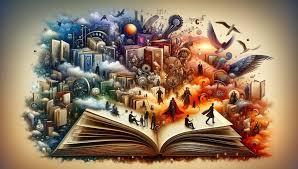The Influence of Literature on Society and Culture
Literature has always been a powerful tool for reflecting, shaping, and challenging societal norms and cultural values. Throughout history, literary works have not only entertained readers but also influenced social change, inspired movements, and provided a window into different cultures and eras. This article explores the profound impact of literature on society and culture, highlighting its role in shaping human thought, fostering empathy, and promoting social progress.
Literature as a Mirror of Society
-
Reflection of Social Issues: Literature often serves as a mirror, reflecting the social issues and concerns of its time. Writers use their works to address topics such as inequality, injustice, and human rights, bringing attention to these issues and prompting readers to reflect on their own society. For example, Charles Dickens' novels like "Oliver Twist" and "Hard Times" highlighted the harsh realities of the Industrial Revolution and the plight of the poor, influencing public perception and social reform.
-
Preservation of History and Culture: Literary works capture the essence of different historical periods and cultures, preserving them for future generations. Through stories, poems, and plays, readers can gain insights into the customs, beliefs, and experiences of people from various times and places. Works like "The Iliad" and "The Odyssey" by Homer provide a glimpse into ancient Greek culture, while Chinua Achebe's "Things Fall Apart" offers a perspective on African societies impacted by colonialism.
Literature as a Catalyst for Change
-
Challenging Norms and Inspiring Movements: Literature has the power to challenge established norms and inspire social and political movements. By presenting alternative viewpoints and questioning the status quo, writers can provoke thought and encourage action. Harriet Beecher Stowe's "Uncle Tom's Cabin," for example, played a significant role in shaping public opinion against slavery in the United States and fueled the abolitionist movement.
-
Promoting Empathy and Understanding: Reading literature allows individuals to step into the shoes of characters from different backgrounds and experiences, fostering empathy and understanding. This can break down prejudices and promote tolerance and inclusivity. Books like "To Kill a Mockingbird" by Harper Lee and "The Kite Runner" by Khaled Hosseini help readers understand the complexities of racial and cultural issues, promoting greater empathy towards others.
Literature and Cultural Identity
-
Expression of Cultural Identity: Literature is a vital means of expressing and preserving cultural identity. Writers often draw on their heritage, traditions, and personal experiences to create works that resonate with their communities. This expression of cultural identity helps maintain a sense of belonging and continuity, especially in the face of globalization and cultural homogenization. For instance, the works of Gabriel Garcia Marquez celebrate Latin American culture and the magical realism that characterizes much of its literary tradition.
-
Cross-Cultural Exchange: Literature also facilitates cross-cultural exchange by exposing readers to different worldviews and traditions. Through translated works and global literature, readers can explore the richness of diverse cultures, fostering mutual respect and appreciation. Nobel laureate Rabindranath Tagore's works have introduced many Western readers to Indian philosophy and aesthetics, bridging cultural gaps and promoting global understanding.
Literature and Personal Development
-
Intellectual Growth and Critical Thinking: Engaging with literature enhances intellectual growth and critical thinking skills. Analyzing complex narratives, themes, and characters encourages readers to think deeply and critically about various issues. This intellectual engagement can lead to a more informed and thoughtful society. Works like George Orwell's "1984" and Aldous Huxley's "Brave New World" challenge readers to consider the implications of political and technological developments, encouraging critical reflection on contemporary issues.
-
Emotional and Psychological Well-being: Literature can also contribute to emotional and psychological well-being. Reading can be a form of escapism, providing comfort and solace during difficult times. Moreover, literature can help individuals process their own emotions and experiences, offering validation and insight. The therapeutic value of literature is well-documented, with bibliotherapy being used to support mental health and personal growth.
Conclusion
Literature is a powerful force that shapes and reflects society and culture. Through its ability to address social issues, challenge norms, and promote empathy, literature has the potential to drive social change and foster a more inclusive and understanding world. By preserving cultural identities and facilitating cross-cultural exchange, literature enriches our global heritage and contributes to a more connected and empathetic society. As we continue to engage with literary works, we are not only entertained but also enlightened, inspired, and transformed.

